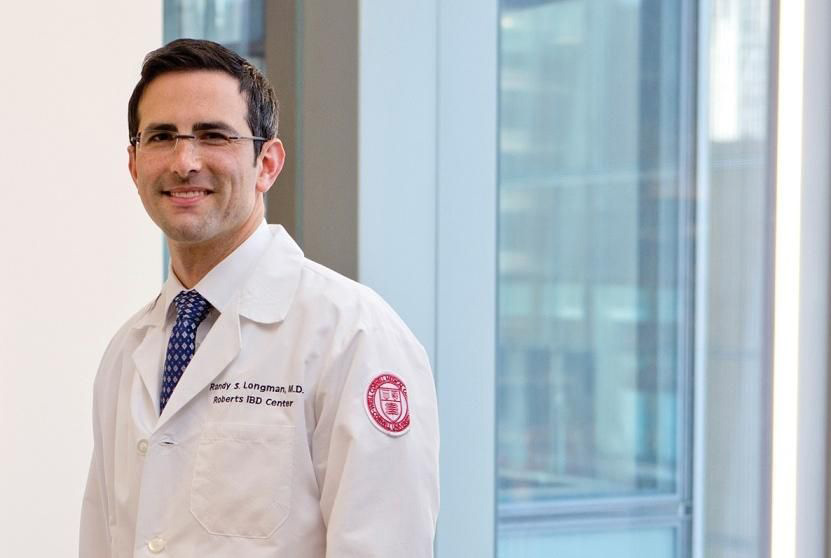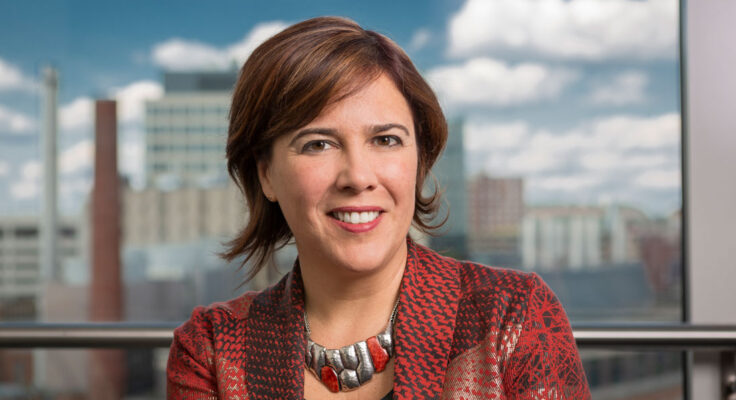Researchers and scientific inquiry worldwide have been impacted by the COVID-19 pandemic. The varied experiences of the Kenneth Rainin Foundation’s Health grantees offer insights into the toll it has taken. Over time, we have also seen countless examples of their resilience, resourcefulness and dedication. Across a spectrum of disciplines, researchers have continued making advances toward preventing, diagnosing and treating Inflammatory Bowel Disease (IBD).
“I continue to be inspired by the resilience and commitment of the scientific community and their ability to adapt to do great research.”
Laura Wilson, PhD, Director, Health Strategy & Ventures
Two of our grantees illustrate distinct and shared ways that the pandemic has disrupted biomedical research and affected the scientific community. Physician scientist Randy Longman, MD, PhD, is a gastroenterologist at Weill Cornell Medical College. Carla Rothlin, PhD, focuses on fundamental research in immunobiology at Yale School of Medicine. Their stories illuminate both the pandemic’s impact and their ability to adapt while advancing groundbreaking ideas in IBD research.
Researchers Navigate A New Landscape
As the pandemic erupted in early 2020, scientific research in labs around the world ground to a halt. For Dr. Longman, that meant culling highly specialized mouse colonies bred for his lab’s preclinical trials. Postdoctoral research fellows in his lab who had spent years developing these preclinical models were now without their primary tools or workspaces. As a clinician, Dr. Longman was also pulled into patient care during the most challenging period of the pandemic in New York City.
“The pandemic had a broad impact on basic and clinical research—changing not only our operations, but also the culture by which our scientific community interacts.”
Randy Longman, MD, PhD, Weill Cornell Medical College
As vaccines became available and laboratories began a staged reopening, Dr. Longman and other investigators navigated a new landscape for clinical and lab-based research. The pandemic created regulatory and logistical hurdles beyond the increased personal protective measures. Clinical researchers faced new COVID-related regulations around tissue samples used for screening and accessing supplies of fecal transplant material for an ongoing clinical trial. Institutional restrictions for in-person contact further impacted recruitment and consent procedures for research participants. These challenges were further augmented by global supply chain challenges.

The Human Toll
The most pronounced impact of the pandemic shutdown for Dr. Rothlin’s lab was its human toll. Like Dr. Longman, she saw her students and trainees—often single and living alone—struggling with the isolation. And as the director of graduate studies, she worries for students across the program. The disruption to their research and education has set back their career development, with possible long-term professional consequences.
Dr. Rothlin also highlighted the international diversity of the scientific community. She and her lab members have been far away from family and other loved ones; her own family is in Argentina. She co-leads the lab with her partner, Sourav Ghosh, PhD, whose aging father and family are in India. The impact on everyone’s ability to focus and work creatively, as well as their emotional well-being has been profound.
The Shared Endeavor Of Science
The pandemic’s toll on human health and medical research was evident in clinical trials as well. Closures and restrictions disrupted one of Dr. Longman’s fecal transplant studies, preventing some patients from receiving active product as scheduled. Several of them were significantly affected, and his progress researching a promising treatment for ulcerative colitis was stymied.
“The pandemic has brought to the forefront that advances in science are driven by people, especially when we come together as a community…You cannot replace those connections virtually.”
Carla Rothlin, PhD, Yale University
Both researchers spoke to the larger context of education and the scientific enterprise as a shared endeavor. Research teams and teacher-student exchanges are compromised by the limitations of Zoom and social distancing. The entire field has been largely cut off from in-person convenings. Yet scientific advances and student learning is driven by human interaction—generating new ideas, supportive relationships and collaboration. Science is a shared endeavor and they are eager to return in person to the community and conversations they value.
Advances Borne Of Necessity
While logistical challenges hindered research, student instruction and scientific collaboration, there were bright spots. Creative problem solving is central to scientific research and numerous advances were borne out of pandemic necessity. The shutdown allowed investigators to pause and reflect on their work—a good practice anytime, by Dr. Rothlin’s reckoning.
Dr. Longman and fellow Rainin Foundation grantee and collaborator Iwijn De Vlaminck, PhD, used the time to overcome emerging technical obstacles in their Synergy Award research. Their goal is to develop a non-invasive blood test to measure Crohn’s disease activity. They also devised streamlined patient consent platforms that leveraged the growth of telemedicine and expanded patient recruitment for clinical trials. That clinical research infrastructure is capturing valuable data about COVID-19 infections and vaccine effectiveness among their nearly 400-person patient cohort.
“The Global Immunotalks series aims to help close the divide between those in the scientific community who have regular access to these kinds of talks and those who do not.”
Carla Rothlin, PhD, Yale University
Dr. Rothlin collaborated with friend and colleague, Elina Zúñiga, PhD, to create Global Immunotalks. This virtual seminar provides global access to extraordinary researchers presenting their latest advances in immunology. Such varied and well-regarded expertise is typically available only to those with the resources to travel to scientific conferences. The Global Immunotalks series has been live on Zoom nearly every Wednesday since April 2020, with recordings collected on their YouTube channel.
Working Together On The Road Ahead
For researchers eager to regain their momentum, the road ahead is a long one—but that is also the nature of scientific inquiry. Fortunately, Dr. Longman’s institution committed to sustaining full pay for lab teams, aided by Rainin Foundation support and others. With an eye on the field’s future, he stressed the need for continued support and flexibility from funders for his fellows’ research time. Their career development and professional success hinge on their research progress. Dr. Rothlin spoke passionately about the essential nature of basic scientific research—even when the roadmap is not clear. She underscored the decades of mRNA research and innovation that ultimately led to new vaccines against COVID-19.
As their research ramps back up, Dr. Longman and his collaborators are benefitting from technological improvements they developed during the shutdown. Dr. Rothlin and Dr. Ghosh are welcoming students and colleagues to their home again, reconnecting their community over his delicious meals. They—like their fellow researchers around the world—are persevering to advance patient treatments and our fundamental understanding of IBD.
“As funders, it’s imperative for us to continue to listen to our grantee community to understand the best ways to support them. Their students and trainees are especially vulnerable, yet essential to the future of science.”
Laura Wilson, PhD, Director, Health Strategy & Ventures

